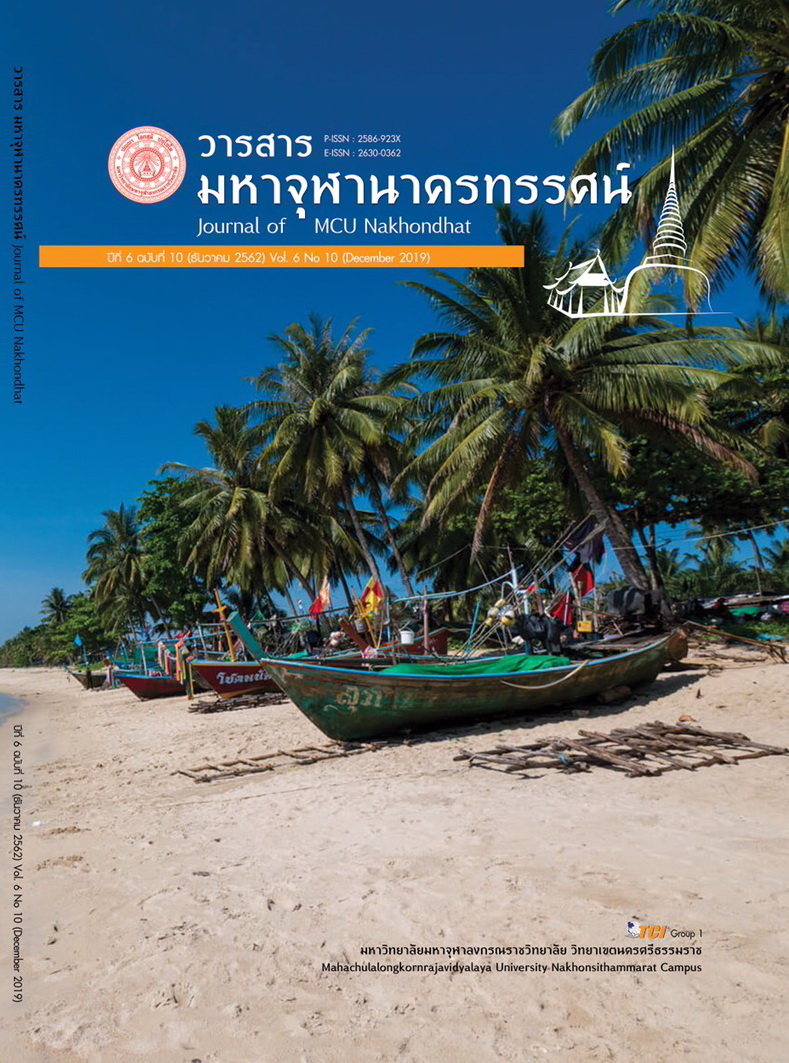ENHANCING STEM PROBLEM-SOLVING SKILLS OF UNDERGRADUATE STUDENTS BY USING THE INTEGRATED STEM EDUCATION WITH ARGUMENTATION LEARNING MODEL (6E+A)
Main Article Content
Abstract
The aims of this study were as follows: 1) to study the effects of using the integrated STEM education with argumentation learning model (6E+A) on STEM problem-solving skills of undergraduate students ; and 2) to study progression of STEM problem-solving skills after using the integrated STEM education with argumentation learning model (6E+A). The studied group consisted of twenty undergraduate students who registered fundamental Physics course in the first semester of the 2018 academic year and willing to participate in extra courses in the third semester of the 2018 academic year. The researchers collected data using the following research tools: 1) four Lesson plan of the integrated STEM education with argumentation learning model (6E+A), totally twenty hours; and 2) STEM problem-solving skills test was an open-ended question.
The research results were as the following:
1) The mean scores of the posttest scores on STEM problem-solving skills was higher than those before the study at a .05 level of significance; and 2) the average normalized gain of STEM problem-solving skills was in the medium gain at 0.68.
Article Details
References
เบญญาภา คงมาลัย และศรเนตร อารีโสภณพิเชฐ. (2558). การพัฒนาสรรถนะการจัดการความรู้ของนิสิตนักศึกษาระดับอุดมศึกษาในศตวรรษที่ 21. วารสารครุศาสตร์จุฬาลงกรณ์มหาวิทยาลัย., 42(1), 37-47.
ปัจฉา ฉัตราภรณ์ และคณะ. (2551). เวลาเปลี่ยน..คะแนนฟิสิกส์เธอเปลี่ยน..ช่างกระไร ใครหนอใครทำ? (ผลการเรียนฟิสิกส์ระดับมหาวิทยาลัย ชั้นปีที่ 1 ในช่วงการเปลี่ยนแปลงระบบการรับเข้าศึกษาต่อในมหาวิทยาลัย). วารสารฟิสิกส์ไทย, 25(3), 19-24.
พรหทัย ตัณฑ์จิตานนท์ และพีระ จูน้อยสุวรรณ. (2556). รูปแบบการจัดการเรียนรู้แบบบูรณาการศาสตร์ที่เหมาะสมในการพัฒนาบัณฑิตรุ่นใหม่. วารสารวิชาการวิจัย มทร.พระนคร ฉบับพิเศษ การประชุมวิชาการมหาวิทยาลัยเทคโนโลยีราชมงคล ครั้งที่ 5, 1(ฉบับพิเศษ),182-192.
เอกภูมิ จันทรขันตี. (2559). การจัดการเรียนการสอนเพื่อส่งเสริมทักษะการโต้แย้งในชั้นเรียนวิทยาศาสตร์. วารสารมหาวิทยาลัยราชภัฏยะลา, 11(1), 217-232.
Burke B. N. (2014). The ITEEA 6E Learning byDeSIGN™ Model Maximizing Informed Design and Inquiry in the Integrative STEM Classroom. Technology and Engineering Teacher, 73(6): (14-19).
Catherine S. (2012). An investigation of science, technology engineering and mathematics (STEM) focused high schools in the U.S. Journal of STEM education, 73(5), 30-39.
Hake R. R. (1998). Interactive-engagement versus traditional methods: A six-thousand-student survey of mechanics test data for introductory physics courses. American Journal of Physics, 66(1), 64-74.
Kaniawati D.S. & Suryadi.S. (2016). Integration of STEM Education In Learning Cycle 6E To Improve Problem Solving Skills on Direct Current Electricity. International conference on Mathematics Science and Education, 3(1), 106-109.
Kim M. et al. (2012). Argumentation as a Tool to Understand Complexity of Knowledge Integration In Proceeding of the 2nd International STEM in Education Conference Beijing: Beijing Normal University. Retrieved November 6, 2016, from https://stem2012.bnu.edu.cn/data/long%20 paper/stem2012_63.pdf
Maryland State Department of Education Office of STEM Initiatives. (2012). Maryland State STEM Standards of Practice Framework Grades 6-12. Retrieved March 5, 2018, from https://mdk12.msde.maryland.gov/ instruction/academies/MDSTEM_Framework_GradesK-5.pdf
Mathis C. A. et al. (2017). Teachers’ Incorporation of Argumentation to Support Engineering Learning in STEM Integration Curricula. Journal of Pre-College Engineering Education Research, 7(1), 75-89.
Next Generation Science Standards (NGSS). (2013). APPENDIX F – Science and Engineering Practices in the NGSS. Retrieved September 17, 2017, from file:///C:/Users/admin/Downloads/Documents/Appendix%20F%20%20Science%20and%20Engineering%20Practices%20in%20the%20NGSS%20-%20FINAL%20060513.pdf


